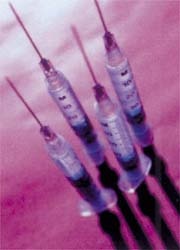80% of sharps injuries are avoidable
Injuries caused by needles and other sharp medical devices - and the related risk of potentially fatal disease transmission - remain a major threat to medical staff.

A film shown at a recent seminar on this subject revealed that between 60-80% of sharps’ injuries are unreported and over 80% of those accidents were avoidable.
Now a campaign against sharps’ injuries is underway, organised by Eucomed, along with the Standing Committee of Nurses of the EU (PCN), the European Dialysis and Transplant Nurses Association/European Renal Care Association (EDTNA/ERCA), European Medical Association (EMA), International Alliance of Patients’ Organisations (IAPO), European Federation of Public Service Employees (EUROFEDOP) and European Institute of Medicine (EOM).
They are asking EU institutions to communicate clear policy and requirements to EU Member States to ensure consistent compliance with existing EU Worker Safety and Health Directives among EU healthcare providers, and in particular:
• to provide better information/education on the risks of exposure, prevention methods and effective incident reporting
• to ensure safer working practices: use of protective clothing, safe disposal and effective response in case of injury
• to use ‘sharps protection’ technology, particularly for high-risk medical procedures
Dr Francisco Jesus Alvarez Hidalgo, Principal Administrator, Commission DG Employment and Social Affairs, pointed out that, in general terms, existing EU worker health and safety directives are sufficient. ‘There is a good piece of legislation and if we manage to implement it, it would be a very important step forward... a current challenge is to emphasise the improvement of workers’ training and awareness, the spread and diffusion of good practices and guidelines.’
MEP Mrs Malliori added: ‘I think that the most difficult part in our discussion has to do not only with directives, the legislation and guidelines, but also with their implementation. Do the Member States have the facilities or the funding to react, to implement or to monitor what we decide? Usually, we are very quick with legislation and we don’t care about implementation.’
Source: Eucomed
30.04.2003





